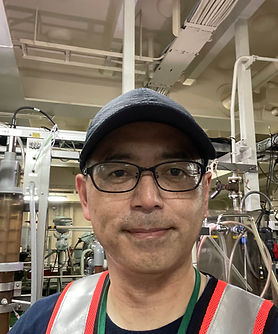
Physiology and Rates in Microbial Oceanography (PRIMO)
Working Group Composition
PRIMO includes 10 Full Members with the range of expertise needed to address the Terms of Reference, including microbial physiology and ecology, molecular biology, biogeochemistry, and numerical modeling, as well as experience in method development, public engagement, and capacity building. The Full Members represent a broad geographic spread from Europe, Australia, Africa, North America, Asia, and the Middle East. The gender balance is 5:5 female:male with two early career researchers (ECR).

Erin Bertrand (Co-Chair; ECR)
Dalhousie University, Canada
Erin Bertrand applies proteomic and metabolomic approaches in the field and the lab to understand marine microbial physiology and biogeochemistry. She has experience using cellular models and proteomics to estimate rates from omic data and is currently working to identify physiological rates that can be estimated directly from quantitative proteomic measurements.

Federico Baltar
University of Vienna, Austria
Federiko Baltar studies the role of microbes (fungi and prokaryotes) on marine elemental cycles, the influence of mesoscale features on microbial functioning and diversity, and the anthropogenic impact on marine microbes and organic matter cycling. He combines physiological rate measurements and
molecular tools with modern -omics approaches on natural communities and cultured isolates.

Susanne Wilkin
University of Amsterdam, Netherlands
Susanne Wilkin focuses on mixotrophic protists to assess their quantitative contribution to ecosystem processes including primary production and bacterivory, as well as the balance of auto- versus heterotrophy in individual lineages. She uses stable isotope probing approaches (RNA-SIP) in the field, physiological assays and transcriptomics in the lab, and is planning to combine those with meta-omics in the future.

Robert Strzepek (Co-Chair)
University of Tasmania, Australia
Robert Strzepek combines classic physiological tools and (meta-)proteomics in the laboratory and field to better understand the physiological ecology of marine phytoplankton and the impact they have on marine biogeochemical cycles, particularly of bioactive metals.

Rachel Foster
University of Stockholm, Sweden
Rachel Foster holds expertise in microbial oceanography with an emphasis on microbial interactions between nitrogen fixing microbes and photosynthetic eukaryotic hosts (e.g., symbioses, consortia). She works in the development of single cell methodologies that couple physiology with rate measurements (e.g. Mass Spectrometry Imaging), microscopy, genome content, and gene expression, so that phenotype and activity can be matched to specific cells.

Thomas Ryan-Keogh (ECR)
SOCCO, South Africa
Thomas Ryan-Keogh works on the development and application of physiological and primary production algorithms on bio-optical data collected in the Southern Ocean to understand seasonal variability and long-term changes. His more recent projects include the applications of these algorithms on a global scale.

Shady Amin
NYU Abu Dabi, UAE
Shady Amin uses multi-omics techniques to study the role microbes play in global biogeochemical cycles with a strong emphasis on symbiotic interactions between phytoplankton and bacteria at the microscale and how they influence large-scale phenomena. He is currently developing techniques in metagenomics and metabolomics at the single-cell level to understand these relationships in the ocean.

Naomi Levine
University of Southern California, USA
Naomi Levine is developing interdisciplinary numerical models that allow us to understand how dynamics occurring at the scale of individual microbes impact large-scale ecosystem processes such as
rates of global carbon cycling. Ultimately, these models seek to incorporate -omic information and trade-offs that individual cells make to predict large-scale biogeochemical rates.

Koji Suzuki
Hokkaido University, Japan
Koji Suzuki studies phytoplankton and diazotrophs in the North Pacific through GEOTRACES-relevant field campaigns and ship-of-opportunity observations between Japan and North America using metabarcoding, metatranscriptome, UHPLC algal pigment, and stable isotope (13C and 15N) labeling techniques.
Associate Members
The Associate Members provide additional expertise and experience in microbial physiology and ecology and modeling. The Associate Members represent a broad geographic spread from Europe, North America, Asia, and the Middle East. The gender balance is 4:6 female:male with two ECR.

Dalin Shi
Expertise: phytoplankton ecophysiology, physiological and biogeochemical measurements coupled with - omics
Network Members
The Network Members bring a wealth of knowledge and skills from diverse backgrounds, enriching collaborative efforts with fresh perspectives and energy.




















.jpg)